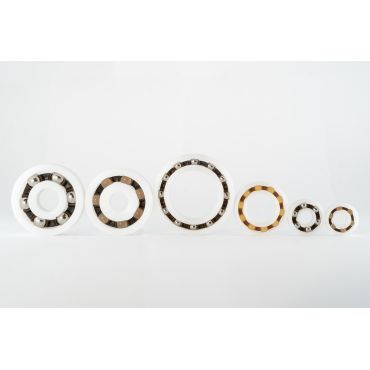
Variations of plastic ball bearings
Plastic ball bearings offer characteristics suitable for various applications. From standard options to alternative materials for enhanced corrosion resistance, SMB Bearings provides a comprehensive range of plastic bearings to meet diverse needs.
Our standard plastic ball bearings feature acetal resin (POM-C) rings, which have excellent corrosion resistance and are among the strongest and stiffest of thermoplastics. Complemented by nylon (PA66) cages, these bearings provide a cost-effective, corrosion-resistant, and non-conductive solution. With options to accommodate shaft sizes from 3 mm to 50 mm, our bearings are readily available from our UK stock.
Characteristics and limitations
Bearings with glass balls or plastic balls are non-magnetic while those with 316 stainless steel balls are slightly magnetic.
Given the softer and lighter nature of plastic compared to materials like chrome steel or 440 grade stainless steel, plastic bearings are best suited for low load and low-speed applications. Due to manufacturing limitations in achieving tight tolerances, similar to 316 marine grade bearings, they are only suitable for low precision applications.
While this product offers specific advantages, it is only suitable for environments and applications where precise tolerances are not critical.
The plastic bearings, shown in the table below, are highly resistant to saltwater and many aggressive chemicals.
See product variants further down the page for flanged plastic bearings.
Rings, cages and shields materials
We can supply plastic bearings with alternative ring or cage materials, such as PEEK, PTFE or PVDF, for greater corrosion resistance or extreme temperatures.
Let's look at the different characteristics of these materials:
- PEEK cages are frequently used in ceramic bearings, 316 stainless steel bearings, and PEEK bearings. Their exceptional corrosion resistance and broad temperature tolerance make them ideal for vacuum applications. What’s more, their low outgassing properties further enhance their suitability for these environments. These can withstand temperatures ranging from -70 to +250 degrees Celsius (°C).
- We use PTFE retainers in bearings made of ceramic, stainless steel, and PTFE. This is because they resist corrosion and can work in a wide range of temperatures, ranging from -190 to +220 °C.
- PVDF's resistance to corrosion from water, saltwater, and chlorine makes it a popular choice for underwater applications. The material is non-magnetic and electrically insulating. It offers a temperature range of -50/+150 °C.
Please note that plastic is more prone to temperature induced expansion and contraction.
We offer open standard bearings but can provide plastic shields upon request.
See bearing materials for more information on plastic grades.
Plastic bearings excel in corrosive environments
Our plastic bearings are highly resistant to saltwater and many aggressive chemicals, making them ideal for challenging environments where corrosion is a concern. Whether in marine settings or corrosive industrial environments, our bearings maintain their integrity and functionality over time.
Plastic bearings can stay underwater permanently, depending on the materials used. Where some metal bearings would corrode over time, plastic bearings will stay intact thanks to their excellent resistance to water and chemicals. They are also much lighter than steel bearings
They are also used in corrosive environments in the food and beverage industry, the pharmaceutical industry or any low load, low precision application that is too corrosive for 440 grade stainless steel bearings.
For example, PVDF bearings are often used in swimming pool environments because they resist chlorine.
For excellent corrosion resistance but higher load capacity, we offer ceramic bearings in zirconia or silicon nitride.
Acetal resin bearings with nylon cages have a temperature range of -30°C to 100 °C. This range can be extended with the use of different ring and cage materials. PTFE can handle cold temperatures, from -190 °C, while PEEK is suitable for high temperatures up to 250 °C.
Click on INFO in the rows below to display technical drawings of the bearings with load and speed data.
Please note that the maximum loads and speeds are used in theoretical life calculations. We recommended using bearings at significantly less than the maximum load and speed ratings to ensure reasonable bearing life.
See product table below for dimensions and technical drawings
Still got questions about plastic bearings? Get in contact with our experienced team today by emailing sales@smbbearings.com or fill in the contact form.

